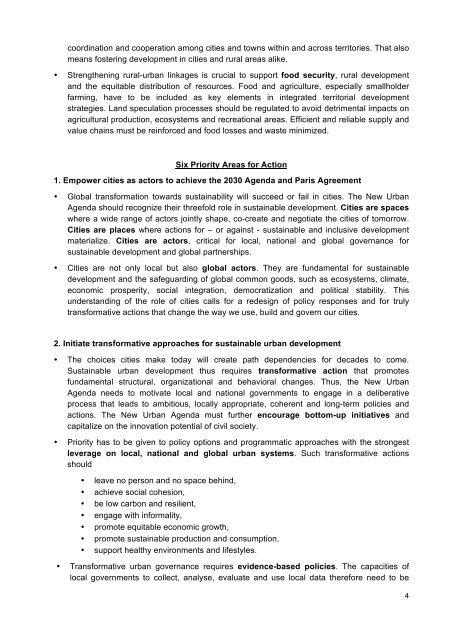Berlin Recommendations for the Cities of Tomorrow
berlin_recommendations
berlin_recommendations
You also want an ePaper? Increase the reach of your titles
YUMPU automatically turns print PDFs into web optimized ePapers that Google loves.
coordination and cooperation among cities and towns within and across territories. That also<br />
means fostering development in cities and rural areas alike.<br />
• Streng<strong>the</strong>ning rural-urban linkages is crucial to support food security, rural development<br />
and <strong>the</strong> equitable distribution <strong>of</strong> resources. Food and agriculture, especially smallholder<br />
farming, have to be included as key elements in integrated territorial development<br />
strategies. Land speculation processes should be regulated to avoid detrimental impacts on<br />
agricultural production, ecosystems and recreational areas. Efficient and reliable supply and<br />
value chains must be rein<strong>for</strong>ced and food losses and waste minimized.<br />
Six Priority Areas <strong>for</strong> Action<br />
1. Empower cities as actors to achieve <strong>the</strong> 2030 Agenda and Paris Agreement<br />
• Global trans<strong>for</strong>mation towards sustainability will succeed or fail in cities. The New Urban<br />
Agenda should recognize <strong>the</strong>ir threefold role in sustainable development. <strong>Cities</strong> are spaces<br />
where a wide range <strong>of</strong> actors jointly shape, co-create and negotiate <strong>the</strong> cities <strong>of</strong> tomorrow.<br />
<strong>Cities</strong> are places where actions <strong>for</strong> – or against - sustainable and inclusive development<br />
materialize. <strong>Cities</strong> are actors, critical <strong>for</strong> local, national and global governance <strong>for</strong><br />
sustainable development and global partnerships.<br />
• <strong>Cities</strong> are not only local but also global actors. They are fundamental <strong>for</strong> sustainable<br />
development and <strong>the</strong> safeguarding <strong>of</strong> global common goods, such as ecosystems, climate,<br />
economic prosperity, social integration, democratization and political stability. This<br />
understanding <strong>of</strong> <strong>the</strong> role <strong>of</strong> cities calls <strong>for</strong> a redesign <strong>of</strong> policy responses and <strong>for</strong> truly<br />
trans<strong>for</strong>mative actions that change <strong>the</strong> way we use, build and govern our cities.<br />
2. Initiate trans<strong>for</strong>mative approaches <strong>for</strong> sustainable urban development<br />
• The choices cities make today will create path dependencies <strong>for</strong> decades to come.<br />
Sustainable urban development thus requires trans<strong>for</strong>mative action that promotes<br />
fundamental structural, organizational and behavioral changes. Thus, <strong>the</strong> New Urban<br />
Agenda needs to motivate local and national governments to engage in a deliberative<br />
process that leads to ambitious, locally appropriate, coherent and long-term policies and<br />
actions. The New Urban Agenda must fur<strong>the</strong>r encourage bottom-up initiatives and<br />
capitalize on <strong>the</strong> innovation potential <strong>of</strong> civil society.<br />
• Priority has to be given to policy options and programmatic approaches with <strong>the</strong> strongest<br />
leverage on local, national and global urban systems. Such trans<strong>for</strong>mative actions<br />
should<br />
• leave no person and no space behind,<br />
• achieve social cohesion,<br />
• be low carbon and resilient,<br />
• engage with in<strong>for</strong>mality,<br />
• promote equitable economic growth,<br />
• promote sustainable production and consumption,<br />
• support healthy environments and lifestyles.<br />
• Trans<strong>for</strong>mative urban governance requires evidence-based policies. The capacities <strong>of</strong><br />
local governments to collect, analyse, evaluate and use local data <strong>the</strong>re<strong>for</strong>e need to be<br />
4



